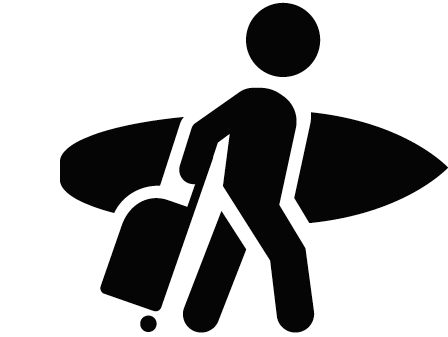Surfing in Belgium

Belgium has one of the shortest coastlines in the world. Located in Western Europe, the country known for its delicious chocolate is bathed by 70 kilometers (43.5 miles) of North Sea. One third of Belgium's coastline has been artificially manipulated by men to protect citizens and properties from the power of erosion. Dunes, for example, are everywhere. Belgium has a temperate maritime climate, which means cool summers and moderate winters. The average temperature is 18°C during summer and 3°C during winter. Breakwaters, jetties and piers are the worst enemies of Belgian surfers. Although these obstacles may create quality point breaks, it is also true that they block the rare quality swells on offer in the North Sea. The North Sea can be dangerous and deadly. Its strong rips and currents add a tricky variable to the local community of surfers. The average water temperature is quite low, so a 6mm wetsuit is compulsory. In the windy Belgian environment, surfers usually have to share the line-up with fellow windsurfers and kiteboarders. The good news is that beach breaks are everywhere. You don't have to worry about rocky bottoms.
Climate in Belgium
The climate of Belgium is cool and wet because it is influenced by the Atlantic Ocean, especially on the coast and the plain. In the south-eastern regions (Ardennes), which are located at higher altitudes as well as at a greater distance from the sea, the climate is more continental, and also more unstable in summer.
Precipitation is frequent, but not particularly abundant. The coastal area is less rainy, and it is also slightly sunnier than the interior: precipitation amounts to 820 millimeters (32 inches) per year in Ostend, located on the coast, to 850 mm (33.5 in) in Brussels, a hundred kilometers (60 miles) away from the coast, and to 1,100 mm (43 in) in Spa, in the Ardennes.
Best surf spots in Belgium
The best Belgian surf spots can all be visited in one morning, around Oostende. The Mariakerke, Westende, and Oostduinkerke breaks are located south, while Bredene can be surfed north of Oostende. Two spots can be discovered near the Dutch border: Blankenberge and Surfers Paradise. There aren't many surf spots in Belgium, but the entire coast is full of impressive opportunities.
Budget Planning
Meal price range
Simple meals start at $12 USD. Mid-rang meals start at $25 USD. Dining & drinking at high-end restaurants can cost anywhere from $100-200 USD
Equipment rental
There are a few surf schools in Belgium where you can rent gear from.
Prepaid SIM cards
Proximus and Orange are a good choice. SIM cards can be purchased from kiosks, shops, the Eurostar train station, official stores. Prepaid packages start at $25 USD.
Public transport
There is an extensive public transport system in Belgium made up of trains, buses, taxis and the underground.
Rental cars start at $40 USD a day.
Gas prices
$1.25 USD a liter.
Types of risks
Breakwaters, jetties and piers.
Strong rips and currents
How to prepare
Visa
Citizens from 62 countries, including the US, and Australia, can enter Belgium without a visa for up to 90 days.
Vaccines
Although it's not mandatory, it’s recommended that you have been vaccinated for hepatitis A & B, yellow fever, typhoid, rabies, meningitis, polio, Tdap, chickenpox, shingles, pneumonia, influenza, measles, mumps and rubella.
Things to know
Language & Currency
There are three official languages Dutch, French, and German.
The Euro (€)
Best time to go
Autumn and spring are more pleasant, but winter is more consistent.
Checking Surf forecast
Checking the forecast about a week before your trip is always a good idea. Understanding what the waves will be like and knowing what gear to pack is essential. You can check the forecast for the waves here.
Do I need pack a pharmacy kit
You should bring a basic kit. Including ear drops, eye drops, bandaids, ear plugs, gaze, alcohol, mosquito repellent and broad spectrum antibiotic ointment.
Travel/Surf Insurance
World Nomads has great travel insurance packages that are not super expensive and they cover surfing.
Emergency
Dial 100 for medical and fire emergencies. And 101 for the police.
Check surf pictures of Belgium at #surfingbelgium.

